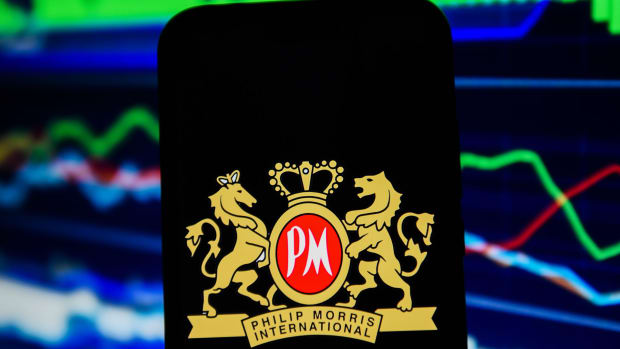
In the 1940s, it was not uncommon to see cigarette ads featuring a smoking doctor or claiming to be "natural" to the clean mountain landscape.
As research on the harms of smoking continued to emerge and show indisputable links to everything from heart problems to lung cancer, cigarette makers have gone through multiple pivots and rebrandings in order to continue to retain customers.
DON'T MISS: Philip Morris International: Let's Smoke Out a Technical Strategy
While a tobacco company being named an ESG stock in 2023 might sound like satire, the head of tobacco giant Philip Morris (PM) just said that he believes it can happen.

Omar Marques/SOPA Images/LightRocket via Getty
Asset Managers Want ESG, Philip Morris International Head Says
The acronym standing for "environmental, social, and governance" is commonly used by investors to identify companies that prioritize social equity and environmental impact alongside pure profits.
In an interview with the Financial Times, Philip Morris International CEO Jacek Olczak said "I think so" when asked whether the company behind selling brands like Marlboro and Virginia Slims outside of the United States could also fit this definition.
PMI is based in Switzerland and is separate from the Altria Group (MO) tobacco company that owns Philip Morris brands in the U.S.
The European Union is particularly strict on ESG requirements for certain financing initiatives and tax breaks. As companies that promote nicotine cannot currently fit this category by definition, tobacco producers are currently feeling the financial impact on a growing focus on ESG.
"I'm not saying that they are building a position in Philip Morris but the asset managers will not spend the time on talking with you if they don’t have in mind that one day is coming that they should reconsider the exclusion," Olczak said.
Amid falling smoking rates, the company has been leaning into the rise of vaping — one estimate calculated that the number of people using e-cigarettes has nearly tripled from 2014 to 2021 while sales related to smoke-free presently make up more than a third of PMI's sales.
As Vaping Takes Over, ESG Claims Would Still Be A Massive Stretch
While e-cigarettes still feed the body a number of toxic chemicals and irritate one's breathing system particularly for younger people, they are widely accepted as a safer alternative to smoking by health profession
It is both this lower risk and rising demand for vape products that PMI will likely lean into heavily to claim on their path to wanting to be seen as an ESG company. Its site currently promotes a "smoke-free future" while Olczak also told the FT that it hopes to have more than half of its sales come from smoke-free products within the next two years.
At a speech in London a few weeks ago, Olczak told an audience that "cigarettes belong in museums" while the company is working to "reduce smoking by replacing cigarettes with less harmful alternatives."
But giving that vaping still contributes to health problems and both indoor and outdoor pollution, it would still be a massive stretch to call companies that sell e-cigarettes ESG in any way.
A number of EU countries are also trying to crack down on vaping, and underage vaping in particular, through everything from higher taxes to advertising bans.
PMI did not immediately respond to a request to clarify Olczak's ESG statements.







